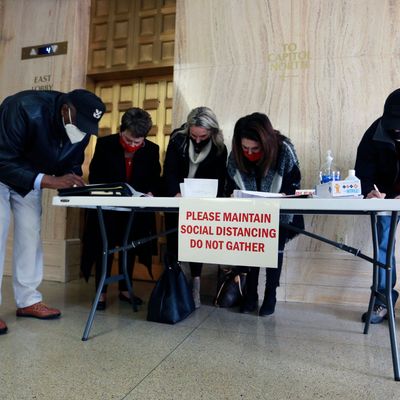
Up to this point, Republican National Committee chair Ronna McDaniel’s efforts to defend the party’s clumsily worded resolution attacking the House Select Committee on January 6 (which was primarily meant to condemn U.S. representatives Liz Cheney and Adam Kinzinger) have been rather clumsy themselves. But now she’s come up with a relatively clear, if questionable, argument: When the RNC attacked the committee for persecuting “ordinary citizens” pursuing “legitimate political discourse,” it wasn’t referring to the January 6 rioters, but the fake Trump electors, who are now facing congressional subpoenas. Politico explains:
According to RNC chair Ronna McDaniel, the phrase “legitimate political discourse” … was a reference to a set of nonviolent GOP activists with close ties to the national party.
Those activists were relatively small in number compared with the thousands who breached the Capitol: They were dozens of state and local GOP leaders who agreed to serve as electors for Trump and signed false documents claiming the former president had prevailed in at least five states that Joe Biden won. In McDaniel’s telling, those Republican activists were engaging in “legitimate” discourse by signing the false certificates and sending them to Washington, a crucial facet of Trump’s last-ditch plan to subvert the 2020 election.
McDaniel’s solicitude for fake electors was made plain in a Townhall post she wrote last week, attacking the Select Committee as “a hostile kangaroo court” that is going after “individuals like one of the RNC’s members who was subpoenaed because, weeks before January 6, she served as an alternate elector pending the outcome of ongoing lawsuits.” McDaniel lamented that the “alternate” elector in question “could face costly legal bills even though she was nowhere near the Capitol on January 6 and had nothing to do with the violence that occurred.”
But the Capitol riot wasn’t the only potential criminal activity surrounding the events of January 6, 2021. Some of these fake electors signed certifications of their authenticity that might warrant investigation under state and federal fraud statutes; in fact, the Department of Justice is already actively investigating the pseudo-electors and the Trump administration plotters (notably Rudy Giuliani) who encouraged them to self-certify. It was all connected to Team Trump’s larger nefarious plan for January 6, as I explained recently:
Clumsy as it was, the fake-elector gambit was a key component of the Trump plan to overturn the election results on January 6, 2021. Creating the illusion of competing slates of electors was supposed to give Vice-President Mike Pence (as subsequently laid out in the famous Eastman memo) an excuse to (a) recognize or count Trump–Pence electors as the “true” winners, (b) prematurely adjourn the joint session of Congress in order to “send the election back to the states” for resolution of conflicting claims, or (c) refuse to recognize any electors in the seven states, throwing the election into the U.S. House. Additionally, the Trump slates might become the basis for congressional challenges to Biden electors, as they did in two cases (Arizona and Pennsylvania).
While McDaniel sees a clear case of congressional persecution of “ordinary citizens” (some of whom are state party officials and RNC members), the innocence of the fake electors is debatable. Some of them keep trying to justify their actions by bringing up an alleged 1960 precedent for their self-certification: a late switch of the certified Hawaii electors from Richard Nixon to John F. Kennedy after a court-ordered recount flipped the extremely close results. This dubious argument might or might not hold up in a court of law, but it is certainly worth a closer look by DOJ and the Select Committee.
So McDaniel’s argument is that the RNC wasn’t defending one set of bad actors (like the guy with the horns cutting capers in the U.S. Capitol) but was defending another (the fake electors, engaged in their own clown-show in various state capitals). To be clear, the fake electors offering themselves up as instruments for Trump’s election coup wasn’t as objectionable as physically assaulting the Capitol and threatening to string up Mike Pence, as some of the rioters did. But it’s still a defense of the overall Trump effort to subvert democracy, and it’s still reprehensible coming from the chair of one of the country’s two major political parties.






























